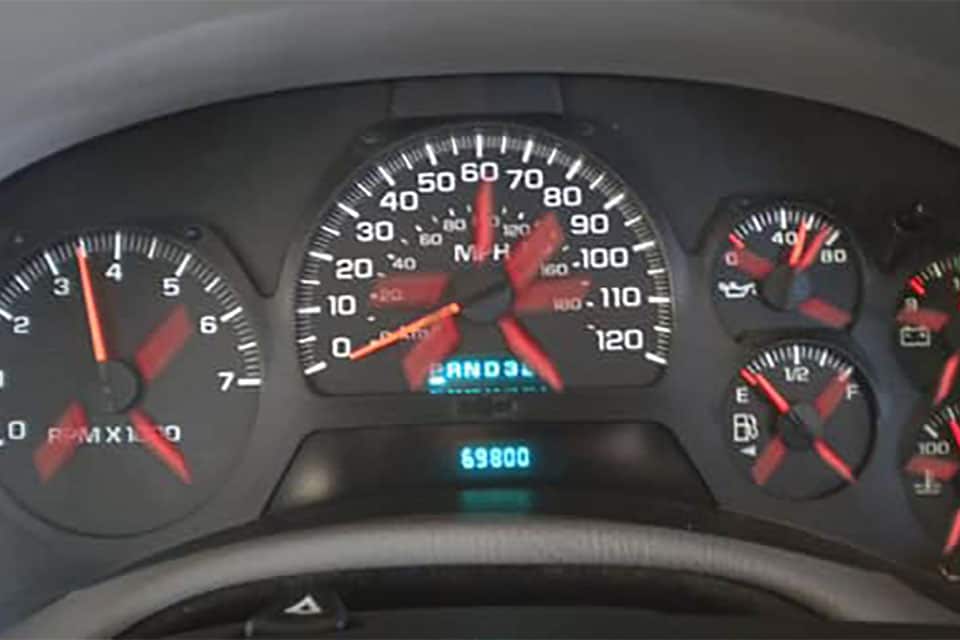Envoy's Gas Gauge Flip-Flops More Than a Politician in Election Season
- The 1st generation Envoy is among a handful of GM vehicles with faulty gas gauges.
- Defects in the instrument cluster and fuel level sensor can cause wildly inaccurate estimates of fuel remaining in the tank.
- The goverment investigated the issue but ultimately deemed it wasn't "safety-related" and worthy of a recall.

One of the more infamously problems with GM vehicles is a faulty fuel gauge that often leaves owners wondering just how much gas is left in their tank. Whether the gauge reads empty after a fill-up, or full while the car is actually running on fumes, there's one thing for certain: the darn thing is just wrong. The problem affects over 30 GM models, but in particular these vehicles have the highest incidence rate:
- 2003-2007 Chevrolet Trailblazer
- 2005-2007 Buick Rainier
- 2003-2007 GMC Envoy
- 2005-2007 Saab 9-7X
Two Possible Problems For the Price of One ∞
There's two possible fail points for this fuel gauge problem, because come on -- you knew it couldn't be simple. The trick is finding out which problem is plaguing your car (if not both ... lucky you).
Instrument Cluster Failure ∞
A common problem with many GM vehicles is to have a faulty instrument cluster. This is especially true in higher mileage vehicles. The problem is due to defective drive motors that fizzle out on the circuit board over time.
Because this is so widespread, repairs are sometimes covered under warranty if your vehicle has under 70k miles and you're really good at jumping through hoops. You know, like circus-good.
If your vehicle is having this problem, it's likely that more than one gauge is failing. So if your fuel gauge is broken, check to see if any of the other gauges -- like the speedometer and engine temp reading -- are acting up.
Fuel Level Sensor Failure ∞
Each fuel tank is equipped with a level sensor that bathes in all that glorious ethanol and monitors the amount of fuel left in the tank. Most fuel sensors don't like an empty swimming pool so when the fuel level gets too low they send you a signal to fill 'er up. Unless, of course, the sensor is defective which appears to be the case in many GM vehicles.
The fuel level sensor in these cars are defective. If you have a high-mileage vehicle some sat it's best just to replace the entire fuel pump assembly.
A Government Investigation ∞
In May 2011, NHTSA[1] opened an investigation[2] into the 2005-07 Trailblazer as well as the GMC Envoy, Buick Rainier and Saab 9-7X. The investigation looked into "defective fuel gauges that give innaccurate fuel level readings."
“Of the 668 complaints, 58 incidents were alleged to result in a vehicle stall,” said the National Highway Traffic Safety Administration in its defect investigations summary. “Of the 58 stalling incidents, 43 complaints reported stalling because the fuel level reading indicated more fuel availability than what is actually in the fuel tank.”
“One complaint alleged a vehicle crash after the vehicle stalled while exiting the interstate, became disabled and was struck from behind.”
The investigation didn't amount to a recall, which is odd. NHTSA only issues recalls in the event of a safety defect and stalling out in the middle of the highway because your fuel gauge is broken seems like a safety issue to me. Unless I misunderstand what safety means? Let's check:
"the condition of being safe from undergoing or causing hurt, injury, or loss"[3]
Nope, I understand it perfectly. Apparently NHTSA needs the vocabulary lesson.
Generations Where This Problem Has Been Reported
This problem has popped up in the following GMC generations.
Most years within a generation share the same parts and manufacturing process. You can also expect them to share the same problems. So while it may not be a problem in every year yet, it's worth looking out for.
1st Generation Envoy
- Years
- 1998–2000
- Reliability
- 2nd out of 32
- PainRank™
- 0.12
- Complaints
- 1